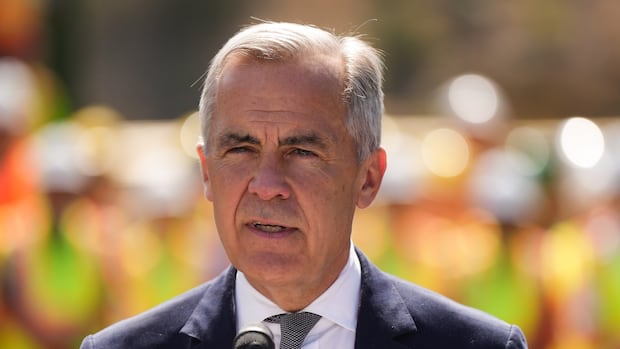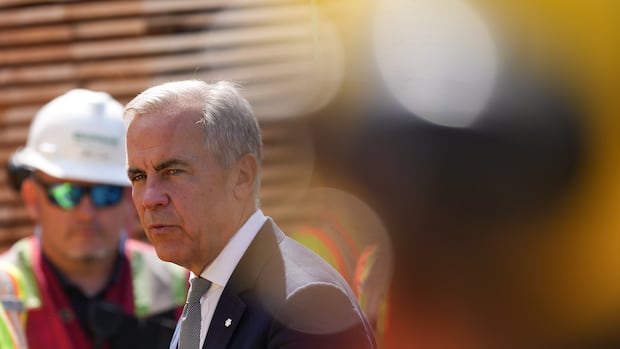Carney hints at dropping some U.S. tariffs if it will help Canadian industries hit by trade war

Prime Minister Mark Carney showed no signs of retaliating against U.S. President Donald Trump's increased tariffs — and even suggested he's open to removing existing tariffs if it would help Canadian industries.
Carney faced questions Tuesday about Canada's next steps after the two countries failed to reach a trade deal by the Aug. 1 deadline, resulting in a 35 per cent import tax on some Canadian goods. The rate applies to goods not covered by the Canada-U.S.-Mexico Agreement, which governs trade between the three countries.
The Trump administration said Canada's higher rate was a response to fentanyl trafficking and its decision earlier this year to hit back with counter-tariffs. In March, Canada imposed 25 per cent tariffs on a list of U.S. products totalling $29.8 billion.
"We've always said we will apply tariffs where they had the maximum impact on the United States and minimum impact in Canada," said Carney when asked why Canada hasn't fired back against the new tariff rate.

"So we don't automatically adjust. We look at what we can do for our industry that's most effective. In some cases that will be to remove tariffs."
The prime minister said his government will "look at opportunities to do so because in the end, we're looking at having the best impact in Canada."
Carney floating the idea of dropping tariffs is notable after Trump granted Mexico a 90-day pause on tariff hikes with the goal of signing a new deal.
His next steps will be closely watched as he juggles expectations from Canadians and an unpredictable president.
Carney, who swept into power after promising to be firm with Trump and land a new trade and security deal, is under pressure from some premiers and industry groups to retaliate hard against Trump.
He also has to manage a president who has a history of hitting Canada hard despite the two countries' long relationship and a trade agreement updated during Trump's first term.
U.S. envoy points to 'energy in the room'U.S. Ambassador to Canada Pete Hoekstra suggested Mexico secured an extension and Canada did not because of the "energy in the room."
"I think it's because of the feeling in the room, or the energy in the room, when the negotiators are talking to each other," he said in an interview with CBC's Power & Politics Tuesday.
The ambassador also maintained that Canada did not get hit that hard.
"Canada's position right now is one that lots of countries around the world would be envious of," he said.

Carney said he hadn't spoken to Trump in recent days and will do so "when it makes sense."
Canada-U.S. Trade Minister Dominic LeBlanc has said he will continue talks with U.S. Commerce Secretary Howard Lutnick and U.S. Trade Representative Jamieson Greer.
The Trump administration continues to link its trade war with illegal fentanyl smuggling, despite U.S. Customs and Border Protection (CBP) data showing that fentanyl seizures from Canada make up less than one per cent of total U.S. seizures of the drug.
Feds pledge over $1B in softwood supportsCarney was in British Columbia to announce $1.2 billion in supports for the Canadian softwood industry which is experiencing another round of devastating duties.
The sector has been a longstanding target of the U.S., which recently raised anti-dumping duties on Canadian softwood. B.C. Forests Minister Ravi Parmar described the hit as a "gut punch" for the province's forestry industry which has seen thousands of workers laid off over the last few years.
Carney called the duties "unjustified" while promising to move the industry away from its dependence on the U.S. market.
"This dependence creates costly uncertainty," he said from the Gorman Bros. Lumber Ltd. mill.
"It weakens our industry's ability to weather downturns. It makes lumber more expensive."

The prime minister unveiled a suite of new measures that he promised would help the industry serve a growing Canadian market "and those of new, reliable trading partners around the world."
Carney said his government will use Canadian lumber and workers as part of its promise to build affordable homes. The Build Canada Homes program, promised during the election campaign, will launch this fall and provide up to $25 billion in financing to private sector home builders.
"We will be our own best customer by relying on more Canadian lumber for Canadian projects," Carney said.
"We are going to write our own story rather than letting others dictate theirs to us."
Carney also announced up to $700 million in loan guarantees for forestry companies and $500 million, largely in grants and contributions, to spur product development and market diversification for the hard-hit industry and millions for reskilling lumber workers.
cbc.ca





